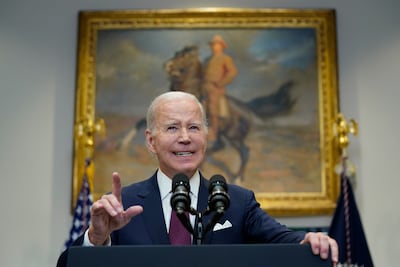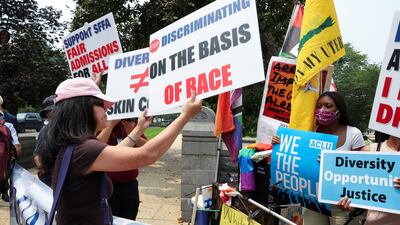The US Supreme Court on Thursday struck down race-conscious student admissions programmes at two universities, dealing a blow to institutions seeking to achieve more diverse student bodies.
The ruling also deals a major setback to black students and some other minority groups who have relied on affirmative action policies for admission.
Thursday's ruling focused on two cases at Harvard University and the University of North Carolina. The decision was made along party lines: 6-2 against Harvard and 6-3 against UNC. Justice Ketanji Brown Jackson recused herself from the Harvard case.
“Many universities have for too long wrongly concluded that the touchstone of an individual’s identity is not challenges bested, skills built, or lessons learnt, but the colour of their skin,” Chief Justice John Roberts wrote in his majority opinion.
Mr Roberts said the Harvard and UNC's admission programmes “cannot be reconciled” with the guarantees of the Constitution's clause of equal protection under the law.
“At the same time, nothing prohibits universities from considering an applicant’s discussion of how race affected the applicant’s life, so long as that discussion is concretely tied to a quality of character or unique ability that the particular applicant can contribute to the university,” Mr Roberts wrote.
The ruling was condemned by President Joe Biden, who said he agreed with the dissenting justices that Thursday's opinion washed away decades of precedent.
“The court has effectively ended affirmative action in college admissions and I strongly, strongly disagree with court's decision,” he said in remarks from the White House.
“Although the court can render a decision, it cannot change what America stands for.”

Mr Biden said he has directed the Department of Education to analyse university practices on diversity, and a fact sheet requesting universities to consider adversities students have overcome in addition to their test scores.
“If a student has overcome had to overcome adversity on their path education, colleges should recognise and value that,” he said.
The cases against Harvard and UNC were brought by a group called Students for Fair Admissions. The group had previously argued that UNC discriminated against white and Asian American applicants, while Harvard was biased against Asian American applicants.
Harvard and UNC said limiting race as a consideration in admissions would result in a decline in enrolling students from minority groups.
In her dissenting opinion, liberal justice Sonia Sotomayor wrote that the decision “rolls back decades of precedent and momentous progress”.
“In so holding, the court cements a superficial rule of colour-blindness as a constitutional principle in an endemically segregated society,” she wrote.

Ms Jackson criticised her conservative colleagues for ruling “with let-them-eat-cake obliviousness”.
“Deeming race irrelevant in law does not make it so in life,” she wrote.
President Barack Obama, the nation's only black president in history, said affirmative action “gave us the chance to show we more than deserved a seat at the table”.
Republican leaders celebrated the decision after years of arguing that affirmative action prevents pupils from being admitted into universities on merit.
“We're going back to all merit-based – and that's the way it should be!” former president Donald Trump wrote on the Truth Social media platform.
House Speaker Kevin McCarthy, Senate Minority Leader Mitch McConnell and presidential candidate Nikki Haley were among other Republicans who lauded the ruling.
In an open letter to members of the community, Harvard University said it will determine how to be consistent with the Supreme Court's ruling while also preserving the university's values.
“To our students, faculty, staff, researchers, and alumni … please know that you are, and always will be, Harvard,” wrote Harvard president Lawrence Bacow and other administrators.
“Your remarkable contributions to our community and the world drive Harvard’s distinction. Nothing today has changed that.”


